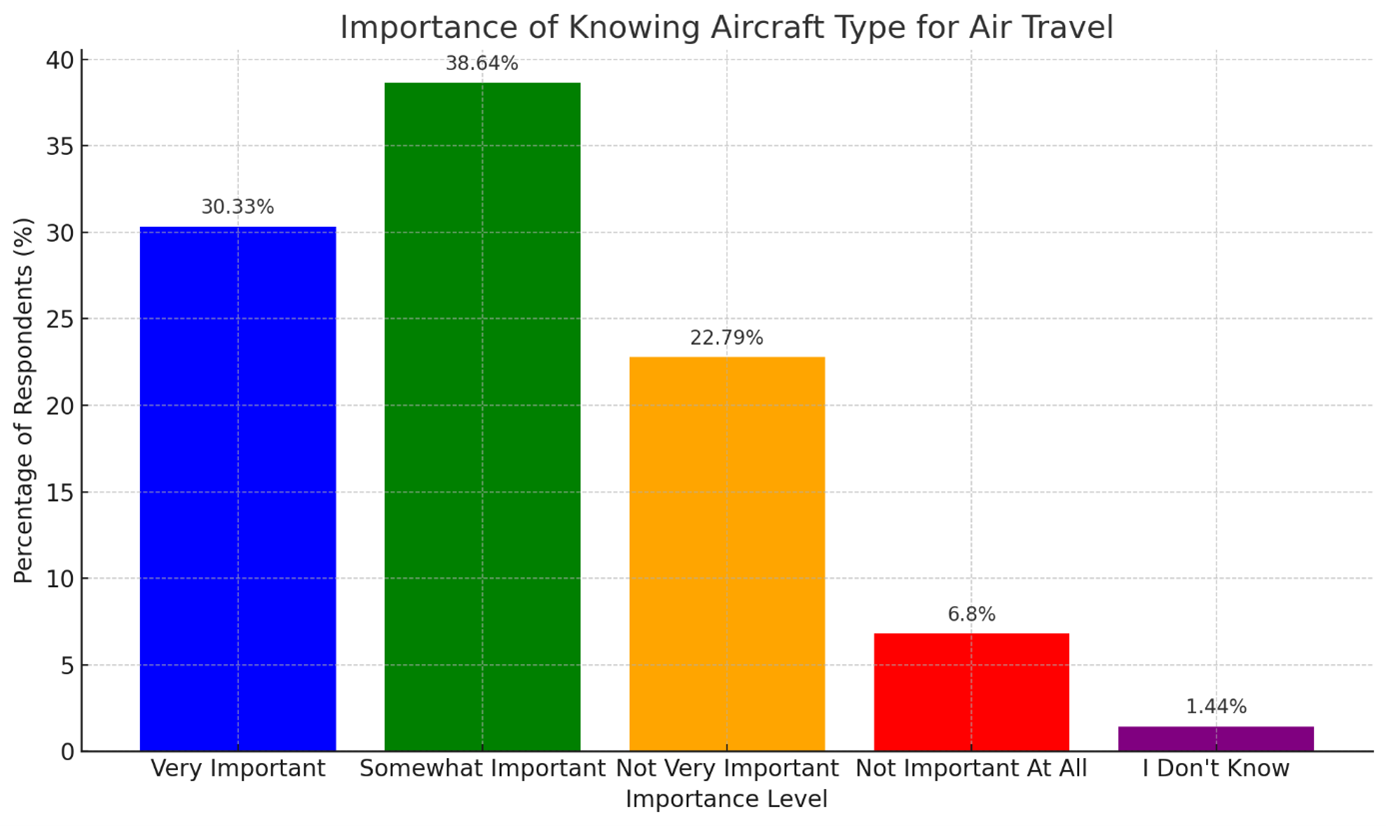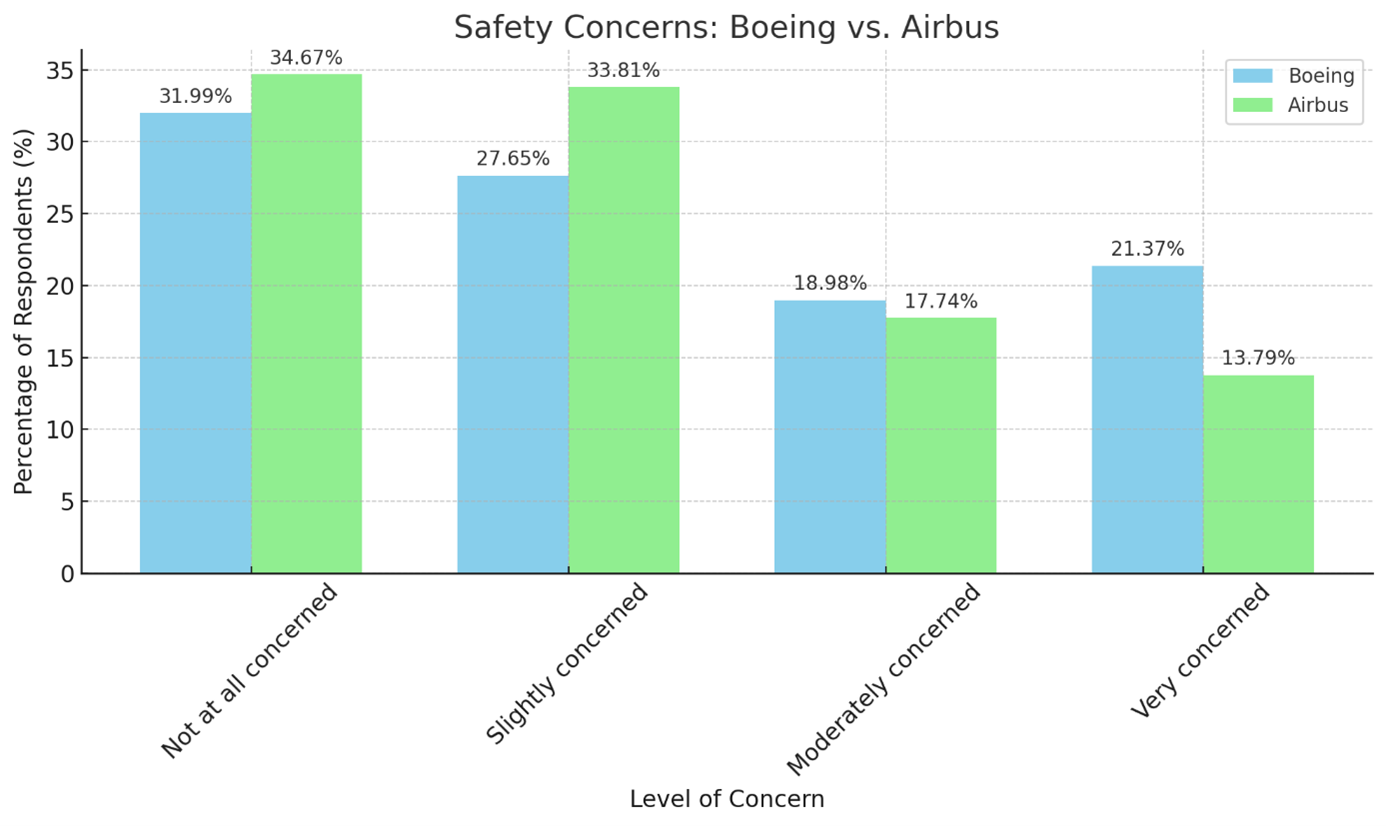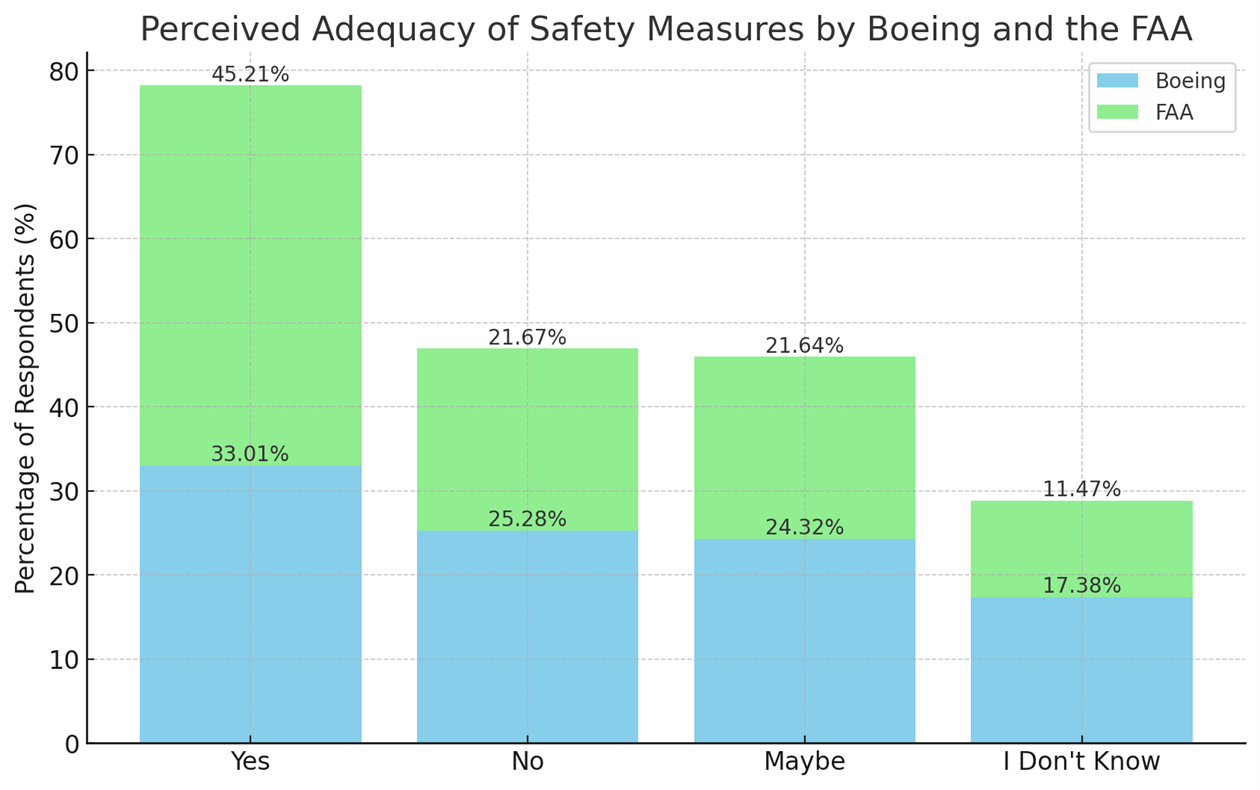Passenger Confidence in Boeing Survey
In the wake of recent controversies surrounding Boeing, a survey was conducted to gauge public sentiment and trust in the aviation giant. This initiative was partly motivated by the fact that the last YouGov poll addressing similar topics was conducted in 2019 (see the poll here).
Methodology
To gauge current passenger sentiments towards Boeing, we conducted a survey among U.S. adults who have flown commercially in the past two years. Using a stratified random sampling approach, we aimed for a representative sample across age, gender, geography, and travel frequency.
Distributed via Pollfish, the survey ran for two days, netting a 50% response rate from 2,000 invites. It included questions on travel habits, safety priorities, awareness of Boeing issues, and trust in safety measures by Boeing and aviation authorities.
Link to our survey results here.
Key Findings
- A majority of respondents (50.22%) would be willing to pay an additional $50 – $150 for tickets on what they perceive to be safer aircraft than Boeing’s, due to safety concerns.
- A significant portion of respondents (36.60%) would choose to avoid Boeing aircraft in light of recent safety incidents.
- Nearly half of the respondents (48.12%) have been aware of negative press coverage concerning Boeing in the past three months.
- An overwhelming majority of respondents (71%) deem it important to know the type of aircraft they will be flying in.
- Half of the respondents feel that neither Boeing nor the Federal Aviation Administration (FAA) have adequately addressed and resolved safety concerns with Boeing aircraft.
- Safety concerns are higher for Boeing (21.37% very concerned) than Airbus (13.79% very concerned), reflecting greater confidence in Airbus.
Willingness to Pay More for Safety
A notable 50.22% of survey respondents indicate a willingness to pay an additional $50 to $150 for their tickets if it means flying on an aircraft perceived as safer than Boeing’s offerings. This finding underscores a significant shift in consumer priorities, where safety concerns directly influence purchasing decisions.

It suggests that passengers are not just passive consumers but are actively assessing risks and are prepared to invest more in their personal safety. This willingness to pay more also highlights an opportunity for airlines and aircraft manufacturers to differentiate themselves on safety features and reputation.
Avoiding Boeing Aircraft
The survey reveals that 36.6% of respondents would choose to avoid Boeing aircraft due to recent safety incidents.

This significant minority reflects a tangible impact on Boeing’s brand perception and customer trust, suggesting that recent controversies have led a substantial portion of the flying public to reconsider their choice of aircraft. This trend could have long-term implications for Boeing, indicating the need for robust measures to rebuild trust and ensure transparency about safety improvements.
Awareness of Negative Press Coverage
Nearly half of the survey participants (48.1%) are aware of negative press coverage concerning Boeing in the last three months. This level of awareness highlights the potent role of media in shaping public opinion and underscores the challenge Boeing faces in managing its reputation.

The awareness also reflects an engaged consumer base that keeps informed about the safety records of the airlines and manufacturers they patronize, suggesting that efforts to improve safety and communication about those improvements are critical.
Importance of Knowing Aircraft Type
A striking 68.97% of respondents consider it important to know the type of aircraft they will be flying in, pointing to a well-informed and safety-conscious group of travelers.

This finding emphasizes the need for transparency in the aviation industry, as passengers increasingly rely on detailed information to make their travel decisions. For Boeing, this signifies the importance of regaining consumer confidence through clear communication about the steps it has taken to address safety issues.
Safety Concerns: Boeing vs Airbus
The chart clearly depicts respondents’ safety concerns, revealing a discernible divide between Boeing and Airbus. A significant portion exhibits greater apprehension towards Boeing, likely influenced by its recent safety incidents.

In contrast, Airbus is viewed more favorably, with fewer respondents expressing heightened concern. These insights highlight the critical impact of brand perception and trust in the aviation industry, emphasizing the ongoing challenge Boeing faces in restoring passenger confidence.
Perception of Boeing and FAA’s Efforts
Half of the respondents believe that neither Boeing nor the Federal Aviation Administration (FAA) has taken adequate steps to address and resolve safety concerns with Boeing aircraft.

This perception signals a significant trust gap and calls for both the manufacturer and regulatory bodies to strengthen their efforts in safety improvements and public communication. It highlights an opportunity for Boeing and the FAA to engage more directly with the public and stakeholders, demonstrating commitment to safety beyond regulatory compliance.
Conclusion
Our survey offers a nuanced glimpse into the evolving perceptions of air travelers regarding Boeing and Airbus, revealing a clear preference for Airbus due to safety concerns.
The willingness of a significant portion of respondents to pay more for perceived safety, along with a considerable trend towards avoiding Boeing aircraft, underscores the impact of recent safety incidents and negative press on Boeing’s reputation.
As we reflect on the shifts since the last comprehensive survey on the topic in 2019, it’s evident that public sentiment towards aviation safety and brand trust remains fluid, heavily influenced by media coverage and the industry’s response to safety concerns.
Fair Use
You can share our content and visuals for any non-commercial purpose. Please just link back to this page in acknowledgment of the original research, writing, and image production by the Casinos.us team.




